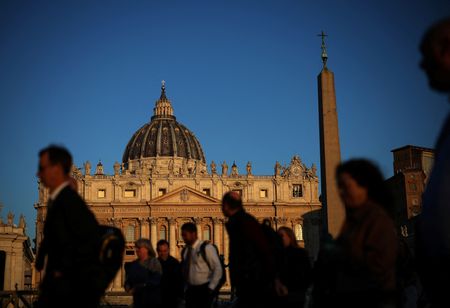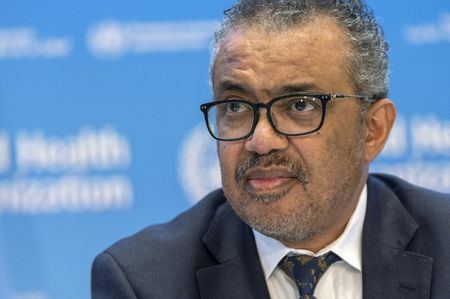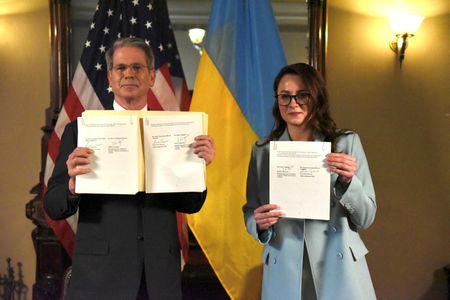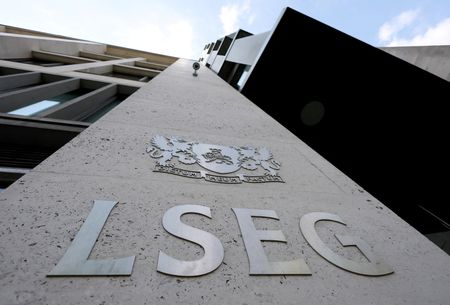By Libby George, Karin Strohecker
LONDON (Reuters) -The death of Pope Francis and global aid cuts led by the United States could complicate the work of a group of experts assembled by the Vatican to bring debt relief and a fairer financing system to the world’s poor.
Developing countries are already grappling with shrinking concessional financing and difficulty accessing bond markets due to the selloff triggered by U.S. President Donald Trump’s sweeping tariffs.
The challenges were highlighted when the Vatican-assembled group, known as the “Jubilee Commission”, presented its draft plan for debt relief and affordable finance at the IMF and World Bank spring meetings last week in Washington.
Less than a year ago, liquidity concerns for the developing world were a priority at such meetings. But in D.C., concrete, high-level talks to increase the amount of development and finance cash for emerging economies took a backseat.
“For any finance minister, central bank governor of a developing country, it is a depressing takeaway from the meetings,” said Reza Baqir, head of sovereign debt advisory at Alvarez & Marsal, and a former Pakistan central bank governor.
Notably, U.S. Treasury Secretary Scott Bessent told the gathering that the world’s richest nation had not yet decided whether it would meet a $4 billion commitment to a lending arm for the world’s poorest countries.
Experts say the shifts could sow the seeds for slow growth and the next cascade of debt defaults.
“More countries will be forced to choose between honouring their debt and ensuring their future,” Paolo Gentiloni, co-chair of the U.N. Expert Group on Debt, said at a panel discussion on the sidelines of the meeting.
Investment bank JPMorgan, in a note summarising the meetings, said that “a new default wave cannot be ruled out by next year” if risks continue rising.
‘HAND GRENADE’
The group drafting the Jubilee report has postponed its plans to present the initial proposals to the Vatican on May 16 due to Pope Francis’s death and the conclave to select his successor scheduled to start on May 7.
Those involved said the work – which will include proposals to help defaulted countries restructure more quickly and to expand access to affordable lending – will continue. They are playing a long game, not focusing on quick wins, Commission Chair Joseph Stiglitz said.
“It is clear that we haven’t solved the problem in any way,” Nobel laureate Stiglitz told Reuters about the developing world’s debt problems, adding that tariff wars amount to a “hand grenade” whose explosion would hit developing nations the most.
The Commission’s work this year sharply contrasts with the last “Jubilee” year in 2000, which yielded billions in historic debt forgiveness to dozens of countries, enabling them to access lending to help their economies grow.
China also lent billions to developing economies in that time, leaving a more complex slate of creditors.
Now, emerging economies that had been limping out of a default wave sparked by external shocks such as the COVID-19 pandemic and the fallout from Russia’s invasion of Ukraine are facing a global economic growth slowdown.
A spike in U.S. Treasury yields has shut many out of global bond markets, and made it expensive for the others.
The World Bank lists 59 countries worldwide as in or at risk of debt distress, and that does not include some that have run into issues more recently, including countries such as Senegal, Colombia and Indonesia.
David McNair, executive director of non-profit advocacy group ONE Campaign, said some of them were putting in place “very stringent austerity measures” to avoid default.
South African Finance Minister Enoch Godongwana told Reuters that the developing world’s liquidity problems were high on the agenda for the G20 top economies, which South Africa is chairing, citing an increase in the number of countries requesting IMF balance of payments assistance.
But countries with cash – like the United States, the United Kingdom, Germany and France – are cutting aid to boost defence spending. According to the OECD, official development assistance fell 7.1% in real terms last year, and is estimated to drop between 9% and 17% this year.
The ONE Campaign estimates it could shrink by 23% by 2027.
China’s lending is also in flux, after the developing world’s default wave and as Trump’s tariffs threaten its economic recovery.
World Bank President Ajay Banga warned that if the U.S. withholds its pledged funds for the International Development Association (IDA), and Europe also cuts, the $100 billion funding round for the lending arm for the poorest countries could drop to $80-$85 billion.
Vera Songwe, chair of the Liquidity and Sustainability Facility who is working with the Jubilee Commission, said the environment for concessional finance and debt forgiveness was undeniably tougher.
But some work, such as getting global south development banks to step up funding and pressuring the IMF to include climate in debt sustainability calculations was progressing, though she added the progress was not fast enough and at scale.
S&P Global Ratings has warned countries are likely to default more frequently in the coming decade due to higher debt and rising borrowing costs. Rising costs to service debt could cut spending on education, infrastructure and health, which help economies grow.
“Sixty percent of growth is happening in the developing world, middle economies,” Songwe said. “If there is slowing down, the world slows down with them.”
(Reporting By Libby George and Karin Strohecker; Editing by Emelia Sithole-Matarise)










